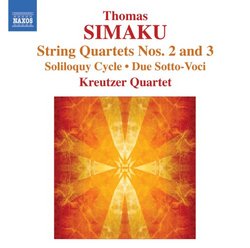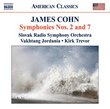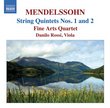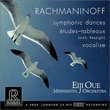| All Artists: Kreutzer Quartet Title: Thomas Simaku: String Quartets Nos. 2 & 3 Members Wishing: 0 Total Copies: 0 Label: Naxos Original Release Date: 1/1/2008 Re-Release Date: 5/27/2008 Genre: Classical Styles: Chamber Music, Historical Periods, Classical (c.1770-1830) Number of Discs: 1 SwapaCD Credits: 1 UPC: 747313042876 |
Search - Kreutzer Quartet :: Thomas Simaku: String Quartets Nos. 2 & 3
CD DetailsSimilar CDs |
CD ReviewsA tough nut worth cracking Jim Shine | Dublin, Ireland | 05/27/2008 (4 out of 5 stars) "This was hard work, but it was worth it. Thomas Simaku, 50 this year, is an Albanian now based in the University of York, U.K., and he writes music in a style that many listeners would not call accessible. If you absolutely must have "tunes" or rhythmic hooks to latch onto, then his music isn't for you. There's a quote from Simaku on the back of the box: "There are no quotations from folk-music here or in any other work of mine, but resonances of that sound-world are now subconsciously becoming part of my own music". On reading this one might still have the impression that folk music is somehow to be heard here, but really it isn't - it's like looking for Gregorian chant in Vivaldi. Now, I hope by this stage I've dissuaded the nervous and intrigued the curious, because for anyone prepared to put in the effort this is a really fine disc. But for me, at least, it was an effort. I admit that contemporary music can be hit-or-miss with me, and with some works repeated listening adds nothing to my understanding or enjoyment. The first piece on this album, Voci Celesti, made a good first impression though. It's an atmospheric work, a sound world that you can feel immersed in. With static passages, drones, and shimmering effects it's an intriguing listen, although I haven't yet decided whether the celestial voices are angels, aliens, or atmospheric phenomena. The other quartet has the title Radius, and Simaku's notes tell us "On a purely musical level, Radius could be described as a textural kaleidoscope with a predominantly heterophonic discourse that unfolds around one single sound-object (ison) possessing the gravitational power". This may very well be the case but it's not the sort of information that makes me want to listen, as such structural conceits are not always easy for the listener to grasp. In fact a lot of the sounds in the quartet made me think of insects; if Simaku had tried to pass it off as an entomological fantasy I'd be more inclined to believe him. The three Soliloquies also have somewhat esoteric concepts, and again for the uninitiated they can be tough going. They're for solo violin, cello, and viola, and are similar in design and mood. The notes I took while listening are full of terms like swirling, sawing, long notes, high registers, plucking, and droning. None of them is conventionally lovely, or indeed unconventionally so, but the sense of a journey is present - like (if I may yet again reach for the natural world for a simile) being in a deep-sea trench, where many mysterious and strange things drift or rush past, and occasionally there's something you half-recognise. Best of all is Due Sotto-Voci, in which a lament-like passage alternates with more vigorous music, the two merging to some extent toward the end. Like the other pieces, this one requires considerable skill from the soloist, though with its more straightforward structure and greater emotional directness I think this one has the best chance of entering the repertoire. I didn't enjoy much of this album when I first listened, but I'm glad I perserved and I can confidently recommend it to anyone not afraid of modern music." Long knives J. Lundquist | Takoma Park, MD USA | 08/25/2008 (5 out of 5 stars) "The other reviewer gave some good info, so I'll just supplement his by saying that I found this CD commendable. The composer's Albanian nationality and study of the folk songs of that area do not really trickle through in the music, save for some droning, which he mentions in the liner notes, so don't get it looking for ethnic permeation. The music is very agitated and abrasive, and reminds one of Threnody-era Penderecki, or Gloria Coates with more sawing. Very intense, but quite good, really."
|






